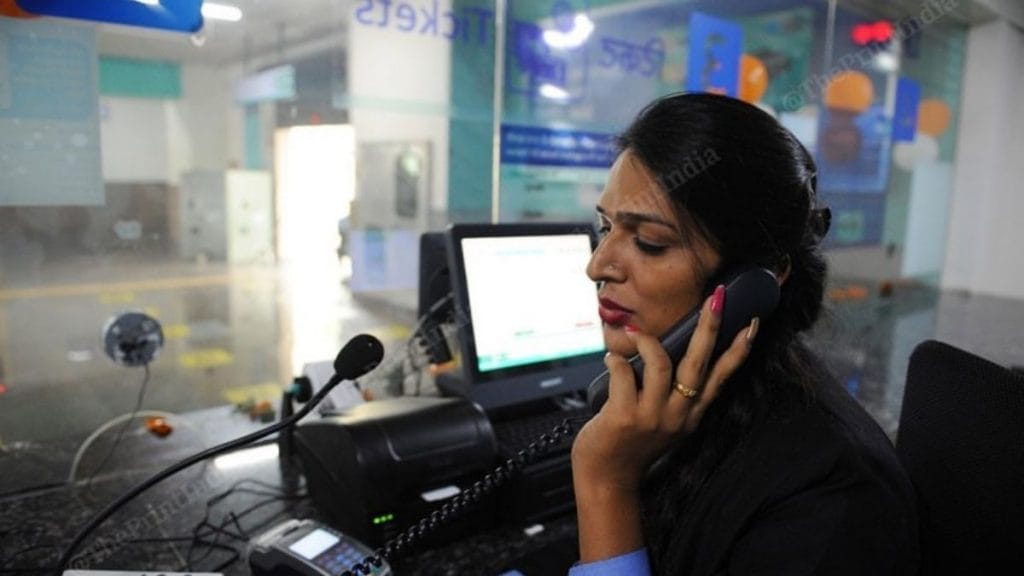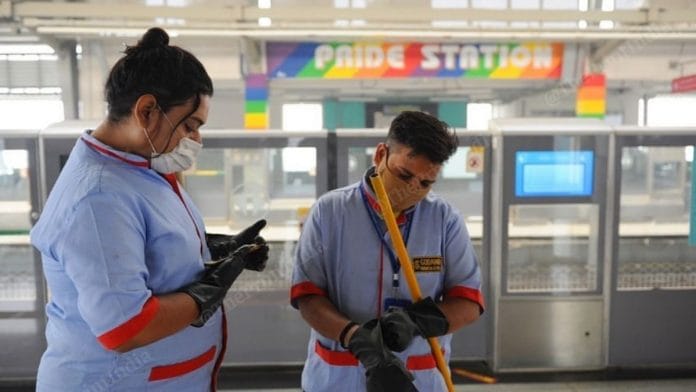New Delhi: Chandigarh Kare Aashiqui was about a transwoman finding love. But before that, can the transgender community in India find enough jobs? In an important move, Noida Authority hired several members of the transgender community in 2020 and 2021. But the job isn’t always easy.
Mannat, a transgender woman who works in Noida Authority’s Public Health Department since 2020, says most workplaces have a long way to go when it comes to being inclusive in practice. Mannat was told at many places, “Aap yahan job karoge toh yahan ka mahaul kharab ho jayega (If you work here, it will disrupt the work atmosphere).”
Mannat is not the only transgender staff working with Noida Authority. In October 2020, it recruited five transgender people as part of its gender-inclusive initiative. The Noida Metro Rail Corporation (NMRC) also hired six transgender persons last year. The selection process included both written exams and interviews. Authorities say they got an “overwhelming response”. But there were only a handful of vacancies.
Also Read: DMRC allows separate toilets for transgenders at Delhi Metro Stations
Noida Authority’s Pride move
In a first for Metro services in north India, the Noida Metro Rail Corporation (NMRC) on 27 October 2020 dedicated the Sector 50 station to the transgender community, and renamed it, ‘Pride Station’.
On 20 November 2021, the NMRC also decided to provide toilets at all Aqualine Metro stations for its transgender staff. The announcement was made on the occasion of Transgender Remembrance Day. Noida Authority happens to be one of the better job opportunities for the community.
Mannat ran a catering service before the Covid pandemic. But her business took a hit with the lockdown. That’s when she joined Noida Authority through an NGO she was associated with called Basera Samajik Sansthan. She completed her graduation from the School of Open Learning under Delhi University. “I went to college just for a day. You know people react when they see a transgender person.”
But Mannat wanted to be self-sufficient and not beg simply because one associates begging at traffic signals or asking for money when a child is born with being a transgender in our country.
“Main kisi ke samne haath nehi phelaungi. (I won’t beg and ask for help),” she says.
Mannat’s current job includes spreading awareness about cleanliness in Noida. She goes door-to-door as part of the awareness campaign to separate dry and wet waste. ThePrint had earlier reported how Noida has taken multiple initiatives to climb the rankings of cleanest cities in India.
“I want transgender people to get jobs in every sector,” says Mannat.
SC Mishra, senior project engineer (public health), Noida Authority said, “We have employed transgenders as per our initiative to be more inclusive. We hired six people last year, and two work with us in the public health sector and are at the forefront of raising awareness about cleanliness.”
Also Read: Selfies are all well, but the pride parade means so much more
Jobs across sectors
Trying to find data on employment in the transgender community in India is difficult for a variety of reasons, from lack of documentation to sex-based surveys that automatically exclude transgenders.
While Noida Authority has taken the initiative to provide opportunities to the transgender community, that cannot be the only avenue for jobs.
Mahi Gupta used to work as a model in Mumbai and was on a trip to Delhi when lockdown hit. She could not go back. After exhausting her savings, she applied for the job of a ticket office operator at NMRC and got it.

Kunal Mahor, who hails from Faridabad, worked in patient care and then as a driver, before he decided to change his sex in 2017. In 2019, he rented a shop and started selling crockery. The lockdown forced him to shut it. He came to know of a housekeeping job in Noida Authority and was selected for it.
Also Read: It’s Pride Month and on Netflix, Hotstar, LGBTQ stories are growing. Here’s a checkout list
Respect, recognition and facilities
While Mannat, Mahi and Kunal do have jobs, they aspire for better pay and respect among coworkers, along with other facilities. Mannat remembers the initial reaction of people to her awareness campaigns was not always warm.
“Seventy-five per cent customers are good, 25 per cent behave badly,” says Mahi.
And none of them has a fixed salary. Since NMRC hired them through third-party enterprises, they still do not have benefits like housing facilities, paid leave, and sick leave.
Better housing and basic infrastructural facilities like separate washrooms are issues that the transgender community grapple with, and they are especially prone to being exploited.
Samrat, who identifies as male and works with Mannat in the public health department, says it is difficult to rent an apartment in the city.
“The moment they realise we are trans, landlords increase rent,” he says.
While love might make the world go round, fulfilment of basic necessities, jobs and dignity is equally important. And for that, the transgender community needs to be a part of the workforce.
(Edited by Neera Majumdar)






